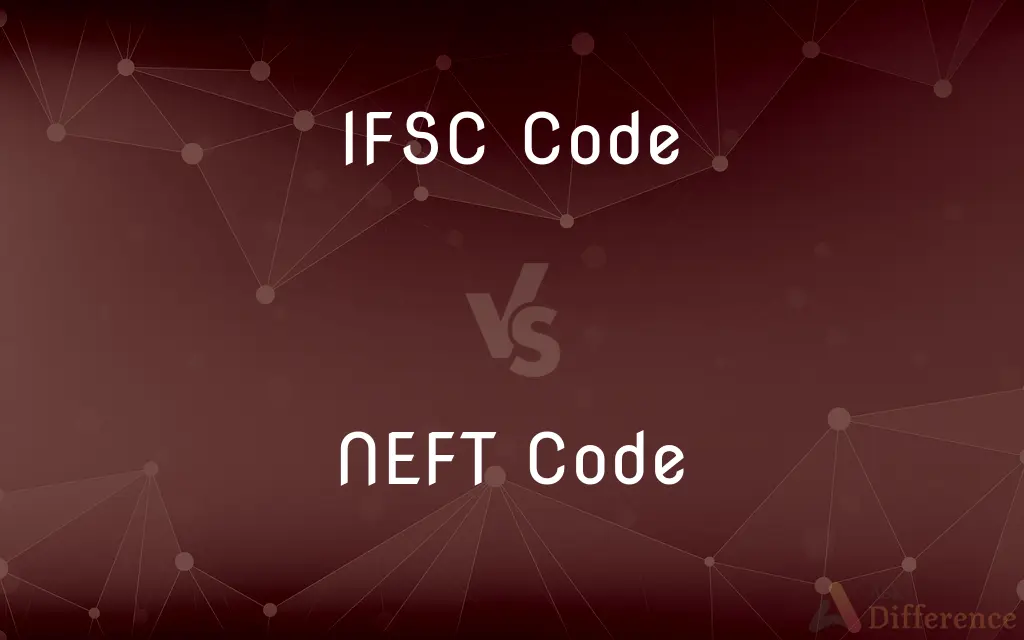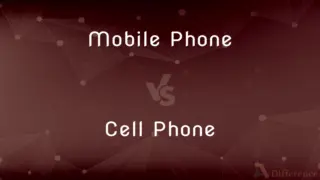IFSC Code vs. NEFT Code — What's the Difference?
By Tayyaba Rehman — Published on December 10, 2023
IFSC Code is a unique bank branch identifier in India, while "NEFT Code" is a misnomer as NEFT uses the IFSC for transactions. Both relate to electronic fund transfers in India.

Difference Between IFSC Code and NEFT Code
Table of Contents
ADVERTISEMENT
Key Differences
IFSC Code and NEFT Code are terms that relate to the banking sector in India, especially in the context of electronic fund transfers. However, the latter is a misconception in terminology.
IFSC Code, which stands for Indian Financial System Code, is a unique 11-character code assigned to each bank branch in India. This code helps identify the bank and branch during electronic fund transfers. In contrast, there isn't a distinct NEFT Code; NEFT transactions utilize the IFSC Code for accurate transfers.
NEFT, or National Electronic Funds Transfer, is a system in India used for transferring money from one bank to another. When one initiates a NEFT transaction, the IFSC Code of the beneficiary's bank branch is required. The term NEFT Code is a misnomer, as the system relies solely on the IFSC for transactions.
The importance of the IFSC Code can't be understated, as it's essential for various electronic fund transfers like NEFT, RTGS, and IMPS. On the other hand, while NEFT Code might be heard colloquially, it's a term that doesn't have a specific role in banking procedures.
In essence, while the IFSC Code serves as a critical piece of information for various fund transfer methods, the term NEFT Code is incorrect and should be replaced with IFSC when discussing NEFT transactions.
ADVERTISEMENT
Comparison Chart
Definition
Unique code identifying each bank branch in India.
Misnomer; no separate code exists.
Usage
Used for NEFT, RTGS, IMPS transfers.
NEFT uses IFSC Code for transfers.
Length
11 characters.
N/A (as it's equivalent to IFSC).
Comprises
Bank code and branch code.
N/A
Importance in Transfers
Crucial for electronic transfers.
Misunderstood term; IFSC is the actual code.
Compare with Definitions
IFSC Code
Mandatory for transferring money across banks in India.
To send money to another bank, you'll need the recipient's IFSC Code.
NEFT Code
Requires IFSC for beneficiary branch identification.
What's the NEFT Code? You mean the IFSC Code for NEFT transactions?
IFSC Code
An 11-character code unique to each bank branch in India.
Every branch has its own IFSC Code to ensure accurate fund transfers.
NEFT Code
A misunderstood term; NEFT uses IFSC Code.
For NEFT transfers, you'll need the beneficiary's IFSC Code, not a NEFT Code.
IFSC Code
Used for electronic fund transfers like NEFT, RTGS, and IMPS.
Always double-check the IFSC Code before initiating a transfer.
NEFT Code
NEFT stands for National Electronic Funds Transfer.
The term NEFT Code is often mistakenly used, but NEFT transactions rely on the IFSC.
IFSC Code
Comprises both bank code and branch code.
The IFSC Code helps pinpoint the exact branch for transactions.
NEFT Code
No separate code exists for NEFT transfers.
I thought I needed a special NEFT Code, but I just had to provide the IFSC.
IFSC Code
Ensures accurate beneficiary identification in transactions.
Using the wrong IFSC Code can delay or misdirect your transfer.
NEFT Code
A system in India for interbank money transfers.
Use NEFT for quick bank-to-bank transfers, but remember to get the correct IFSC Code.
Common Curiosities
What does the IFSC Code represent?
It's a unique code for each bank branch in India used in electronic fund transfers.
Is "NEFT Code" the correct term?
No, it's a misnomer. The right term is IFSC Code for NEFT transactions.
Is there a separate NEFT Code for transfers?
No, NEFT transactions use the IFSC Code.
How long is the IFSC Code?
It's an 11-character code.
What happens if I use the wrong IFSC Code in a transfer?
The transaction may be delayed, returned, or misdirected.
How is IFSC different from MICR?
IFSC is used for electronic fund transfers, while MICR is used for check processing.
Can I use the IFSC Code for methods other than NEFT?
Yes, IFSC is used for NEFT, RTGS, and IMPS transfers.
How crucial is the IFSC Code in banking transfers?
It's vital for accuracy in electronic fund transfers.
Where can I find my bank's IFSC Code?
It's often on your checkbook, bank statements, or the bank's website.
How frequently can I make NEFT transfers?
NEFT operates in hourly batches, but individual bank policies might differ.
Do all banks in India use NEFT?
Most major banks in India support NEFT transactions.
Do international banks have an IFSC Code?
Only bank branches operating in India have an IFSC.
Is it safe to share my IFSC Code?
Yes, the IFSC Code is public information, but always be cautious with other banking details.
Does NEFT have any transfer limits?
Yes, depending on the bank and the type of account, NEFT may have daily limits.
Can I use NEFT for international transfers?
No, NEFT is only for domestic transfers within India.
Share Your Discovery

Previous Comparison
Mobile Phone vs. Cell Phone
Next Comparison
Alkali Metals vs. Alkaline Earth MetalsAuthor Spotlight
Written by
Tayyaba RehmanTayyaba Rehman is a distinguished writer, currently serving as a primary contributor to askdifference.com. As a researcher in semantics and etymology, Tayyaba's passion for the complexity of languages and their distinctions has found a perfect home on the platform. Tayyaba delves into the intricacies of language, distinguishing between commonly confused words and phrases, thereby providing clarity for readers worldwide.












































